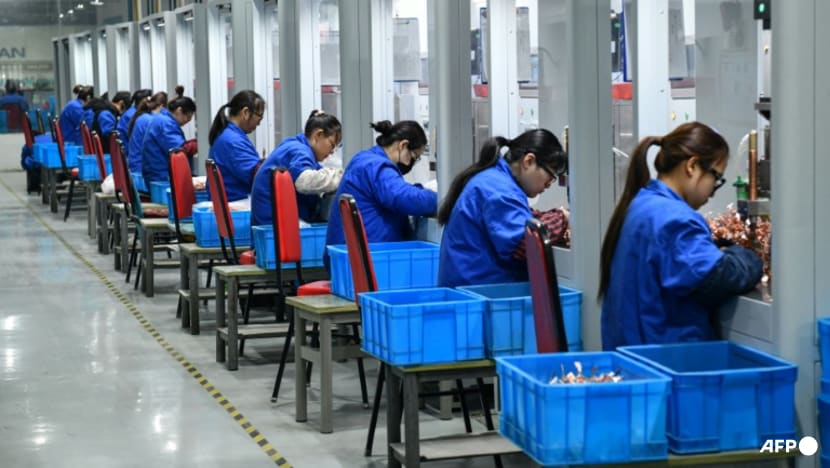Job creation, GDP target among key economic indicators to look out for at China's two sessions
The annual GDP growth number is closely watched as the effect of a more demanding target will cascade down to other aspects of policy-making.

China's economy enjoyed an initial post-pandemic rebound, but ran out of steam within months. (Photo: AFP)

This audio is generated by an AI tool.
BEIJING: At China’s most important annual political meetings - the two sessions - which begin on Monday (Mar 4), all attention will be on the country’s key economic indicators.
Analysts have speculated that the central government will set a gross domestic product (GDP) growth target of around 5 per cent. This is after at least five of China’s top urban economies had set their targets at above 5 per cent during the local versions of the meetings.
However, chief economist at Hang Seng Bank China, Ms Wang Dan, said it is a tall order, given the relatively high base of 5.2 per cent growth in 2023. She said a target of around 4.5 per cent would be more viable.
“If we set a higher than 4.5 per cent target, that means the economy needs a much bigger boost, especially in the housing market. But the fundamentals in China are relatively weak at this point,” she told CNA.
“Blowing up the housing bubble is not in the government’s or individuals’ best interest. So a lower target is more realistic.”
The annual GDP growth forecast is closely watched as the effect of a more demanding target will cascade down to other aspects of policy-making.
“If it is around or higher than 5 per cent, that means China will continue to implement pro-growth fiscal policies, and also a rather pro-growth monetary policy. Anything that's below 5 per cent means that China will focus more on innovation or transition to a more sustainable green economy,” said Mr Li Wei, senior China economist at Standard Chartered Bank.
SLUGGISH PROPERTY SECTOR
Amid a challenging outlook, including the sluggish property sector, some economists also expect the government to set a higher budget deficit target this year of around 3.5 per cent, up from 3 per cent last year.
Latest data showed that home sales by 24 major developers – traditionally a key growth driver – tumbled more than 40 per cent in January this year.
“The housing market has been the biggest drag for China's economic recovery, and it will continue to be. And as time goes by, the housing sector will also become a big burden for smaller regional banks,” said Ms Wang.
“They (the banks) are highly exposed to not just local loan debt, but also the loans to real estate developers. So I think more measures have to come out to stabilise the expectation in the housing market, at least, to have a clearer expectation on how much further the housing prices can fall.”
JOB MARKET
Another closely watched number is the government’s job creation target.
Officials said that in December, the unemployment rates for Chinese youths aged 16 to 24 stood at 14.9 per cent, and 6.1 per cent for those aged between 25 and 29, higher than the nationwide jobless rate of 5.1 per cent.
About 84 million people are currently engaged in what officials call new forms of employment such as delivery work and online ride-hailing.
The government last month issued new regulations in a bid to beef up protection for them.
“This is probably the most difficult year for young people when it comes to their job market perspective. And also for low skilled workers, the job quality has deteriorated. The working hours have been significantly longer. As time goes by, the average wage growth has declined quite significantly,” said Mr Wang.
CONSUMER SPENDING
Even though another key indicator, consumer spending, has rebounded from a slump during the COVID-19 pandemic, it has yet to fully return to pre-pandemic levels.
For instance, business at well-known ice creamery Bonus Gelato is far from as good as pre-pandemic times, said salesperson Xiang Yu.
The store, which is known for offering flavours popular with Chinese customers, used to attract long lines.
Official figures bear the same trend. Over the Chinese New Year holiday, while travel and spending exceeded pre-pandemic levels, spending per capita dropped about 9 per cent compared to 2019.
"Consumer confidence index released by the National Bureau of Statistics has been staying below 100, which means people feel a bit worried about their future incomes, future jobs, and the future economic growth,” Mr Li noted.
“That, I think, is the top priority for the government to revive and to ensure continued recovery in consumer confidence.”












.png?itok=QcrVJIPG)




